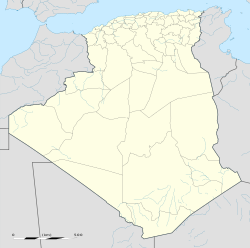
Summary
Rusubbicari was a Phoenician and Carthaginian colony and Roman town. It has been tentatively identified with ruins at Zemmouri El Bahri, Algeria.[1] The Roman town was in the province of Mauretania Caesariensis.[2][3][4]
 Shown within Algeria | |
| Location | Algeria |
|---|---|
| Coordinates | 36°48′N 3°34′E / 36.800°N 3.567°E |
Name edit
The present name is a masculine plural noun, suggesting it may have originally consisted of two or three separate settlements. It seems to a latinization of a Phoenician name including the element rush (Punic: 𐤓𐤀𐤔, RʾŠ, "cape") and a local Berber placename.[5]
Religion edit
Rusubbicari was a Christian bishopric in late antiquity and is a Catholic titular see (Latin: Dioecesis Rusubbicarensis).[6]
List of bishops edit
This list is incomplete; you can help by adding missing items. (November 2018) |
- At the 411 Carthage conference between Catholic baptists and Donatists of Roman Africa, the town was represented by the Donatist Costanzo as the diocese on that occasion had no Catholic bishops.
- Paolino participated in the synod assembled in Carthage in 484 by the Vandal King Huneric, after which Paolino was exiled.
- José da Silva Chaves (November 29, 1967 – May 14, 1976 appointed bishop of Uruaç)
- Victor León Esteban San Miguel y Erce (May 31, 1976 – April 4, 1995 deceased)
- Douglas William Young (14 April 2000 – 17 July 2006 appointed Archbishop of Mount Hagen)
- Sergio Osvaldo Buenanueva (July 16, 2008 – May 31, 2013 appointed bishop of San Francisco)
- Jose Puthenveettil, since August 23, 2013
Today Rusubbicari survives as a titular bishopric holder; The current bishop is Jose Puthenveettil, auxiliary bishop of Ernakulam-Angamaly.[7]
See also edit
References edit
Citations edit
- ^ Salama, Pierre. Sites commerciaux antiques sur le littoral de l’Algérois. In: Mélanges de l'École française de Rome: Antiquité, vol. 118, n°2. 2006. pp. 527-547.
- ^ Pius Bonifacius Gams, Series episcoporum Ecclesiae Catholicae, (Leipzig, 1931) p. 468.
- ^ Stefano Antonio Morcelli, Africa christiana, Volume I, (Brescia, 1816) p. 267.
- ^ J. Mesnage, L'Afrique chrétienne, (Paris, 1912) pp. 461–462.
- ^ Lipiński (2004), p. 402.
- ^ Annuario Pontificio 2013 (Libreria Editrice Vaticana, 2013, ISBN 978-88-209-9070-1), "Sedi titolari", pp. 819-1013
- ^ Rusubbicarensis at Catholic-hierarchy.org.
Bibliography edit
- Lipiński, Edward (2004), Itineraria Phoenicia, Orientalia Lovaniensia Analecta, No. 127, Studia Phoenicia, Vol. XVIII, Leuven: Uitgeverij Peeters, ISBN 9789042913448.


